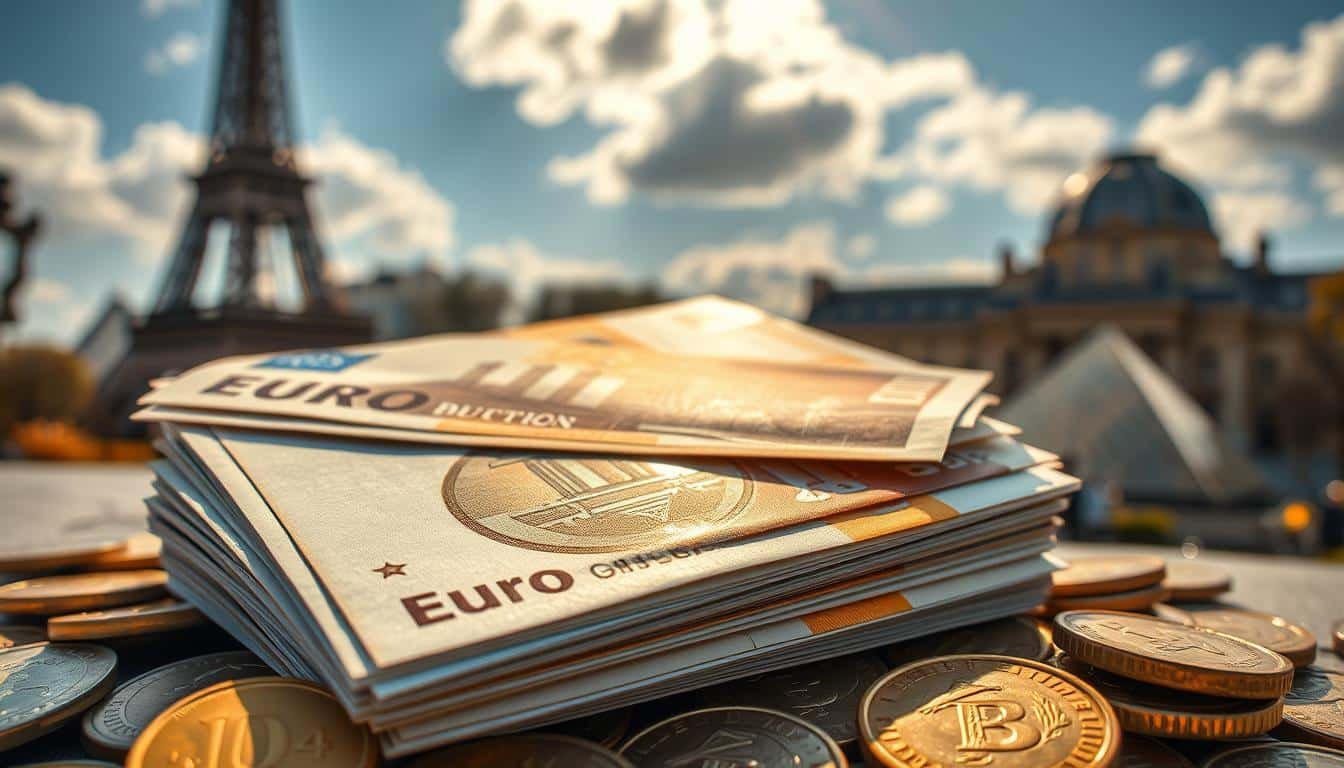
When you’re planning a trip to France, it’s key to know what currency they use. The answer is the euro (€)1. You’ll also want to learn about the euro france exchange rates and the different denominations available. The euro is the official currency of France and is also used in 18 other European countries1.
Euro banknotes come in seven different values: €5, €10, €20, €50, €100, €200, and €5001.
Whether you’re heading to Paris or the countryside, knowing the local currency is important. The euro (EUR) is the second most traded currency globally, after the US dollar (USD)1. France is part of the Eurozone, which includes 19 countries using the Euro2. As you get ready for your trip, learning more about France’s currency and how to exchange it will be helpful.
Key Takeaways
- The official currency of France is the euro (€)1.
- Euro banknotes are available in seven denominations1.
- France is one of the 19 countries in the Eurozone using the Euro as their main currency2.
- The euro (EUR) is the second most traded currency in the world1.
- Understanding the local currency will make your trip to France more enjoyable.
- You can exchange your money at banks, ATMs, or currency exchange bureaus2.
- Avoid exchanging money at airports due to high fees and rates2.
What Currency Does France Use Today
When you travel to France, knowing the local currency is key. France uses the euro, which is common in many European countries3. You can find euros in coins and banknotes, from 1 cent to 500 euros3. To get euros, you can exchange money at a bank or use an ATM4.
The euro is widely accepted in France. You can use it for food, transport, and even hotel stays4. Places like the Louvre accept euros for entry4. Remember, the euro’s value changes daily, so check the rate before you exchange4.
Here are some prices in euros to help plan your trip:
Using euros in France is easy and accepted everywhere, making your trip smooth3. With some planning and knowledge of the local currency, your trip to France will be a success4.
| Denomination | Euro Coin | Euro Banknote |
|---|---|---|
| 1c | X | |
| 2c | X | |
| 5c | X | |
| 10c | X | |
| 20c | X | |
| 50c | X | |
| 1 euro | X | |
| 2 euro | X | |
| 5 euro | X | |
| 10 euro | X | |
| 20 euro | X | |
| 50 euro | X | |
| 100 euro | X | |
| 200 euro | X | |
| 500 euro | X |
The History of French Currency
The history of French currency is long and complex. The franc was the official currency from 1795 to 20025. It saw changes, like a revaluation in 19606. In 2002, the franc was replaced by the euro, a big change in France’s money history5.
The franc was introduced in 1795 and used for over 200 years5. The Bank of France managed it, with 100 subunits called centimes5. The French franc’s history goes back to 1360, with the gold franc introduced in 18035.
Some key facts about the French currency include:
- The French franc was replaced by the euro on January 1, 20025.
- The franc was accepted as legal tender in Belgium, Luxembourg, Andorra, and Monaco before the euro5.
- The Maastricht Treaty was approved by the French public in 1992, leading to the euro’s implementation5.
The euro’s introduction was a major change for France’s currency5. Knowing about French currency history helps us understand France’s economy and its role in the European Union6.
Using Euros in France: A Practical Guide

Traveling to France means knowing the local money and how to pay. The Euro (€) is the official france legal tender. It breaks down into 100 cents (centimes)7. You’ll find many Euro bills and coins, like 500€ and 2€ coins7.
To get the best rates, use ATMs or bank exchanges. They usually offer better deals than france foreign exchange offices8. Many places accept Visa and Mastercard, with a limit of €50 for contactless payments8. But, be careful of extra charges for small purchases8.
Here are some tips for using Euros in France:
- Carry both cash and cards, as some places only take cash7.
- Know the tipping rules in France. A 2-3% tip is standard for good service7.
- Exchange money at banks or use ATMs for the best rates8.
By following these tips, you’ll be ready to handle your money in France. You’ll enjoy your trip even more9.
| Denomination | Description |
|---|---|
| 500€ | Largest Euro bill denomination7 |
| 2€ | Largest Euro coin denomination7 |
Understanding Euro Exchange Rates
When you travel to France, knowing the euro exchange rates is key to saving money. The euro is France’s official currency. Its value changes based on the country and the economy10. You can exchange your money at banks, currency exchange offices, or use an ATM to get cash.
To find the best exchange rate, check the current rate before you exchange your money. Online tools or a financial expert can give you the latest info. Also, watch out for fees like commission or ATM charges11.
Here are some tips for exchanging money in France:
- Use reputable currency exchange offices or banks to avoid high fees.
- Avoid exchanging money at airports or tourist areas, as the rates may be less favorable.
- Consider using a credit or debit card with no foreign transaction fees.
By understanding euro exchange rates and following these tips, you can save money in France. Always check the current exchange rate and know about any fees10.
| Currency | Exchange Rate |
|---|---|
| US Dollar (USD) | 1 USD = approximately 0.94 EUR10 |
| British Pound (GBP) | 1 GBP = approximately 1.16 EUR10 |
The Euro’s Impact on French Economy

Understanding the Euro’s role in France’s economy is key. The Euro has boosted trade and investment in France. French trade with Euro countries rose by 33% after the Euro’s introduction12. This growth has helped the French economy expand, making it easier for businesses to trade with Europe.
The Euro has also drawn more foreign investment to France. This has opened up new opportunities for businesses and individuals. Tourists find it easier to visit France, boosting tourism and the economy. So, the Euro has positively influenced france money and the economy overall.
The Euro has greatly impacted French trade. It has reduced risks and costs for businesses trading with Europe. Trade between Euro-zone countries increased by 15% from 1998 to 200212. This has made investing in other European countries easier, fostering growth.
The Euro’s effect on France’s economy is complex. While it has caused inflation and reduced monetary control, its overall impact is positive. It has streamlined trade and investment, creating new opportunities for growth. So, the Euro has significantly influenced currency in france and the economy.
Digital Payment Methods in France
Traveling to France means knowing about digital payment options. The country is moving towards more digital payments, with contactless payments on the rise13. In 2022, contactless payments jumped to 8.6 billion, up from 6.8 billion in 202113.
Mobile payments like Apple Pay and Google Pay are common in France14. PayPal and digital wallets from French banks are also popular. The French mobile payments market is set to grow by 30% yearly until 202713.
To learn more about payment options in France, check out this link. It covers credit and debit cards, digital wallets, and more. Knowing about france euro and french currency can make your trip smoother.
- Mobile payments (Apple Pay, Google Pay)
- Digital wallets (PayPal, French bank services)
- Contactless payments
Digital payments in France are easy and safe. As France moves towards a cashless society, knowing your payment options can enhance your travel experience.
Conclusion: Managing Your Money in France
When you travel to France, knowing about the Euro is key. It helps you enjoy your trip without money worries. You’ll learn about exchanging currency, digital payments, and local tips15.
Don’t exchange money at airports. They charge high rates because they have no competition15. Use a travel debit card like Wise for better rates and fewer fees15. Carry some EUR cash and cards for easy payments in France15.
Exchange rate changes can affect your money and investments16. Spread your money across different currencies to reduce risk16. Getting advice from a financial expert can also help16.
With the advice from this article, you’re ready to handle your money in France. Enjoy the culture, food, and views without worrying about money1516.
FAQ
What currency does France use?
When did France adopt the Euro?
What are the denominations of the Euro?
What was the currency used in France before the Euro?
Can I use credit/debit cards in France?
Where can I exchange currency in France?
How do digital payments work in France?
How has the Euro impacted the French economy?
Source Links
- France Currency: What to Know About Money in France (2025) – https://wavesandcobblestones.com/paris-currency-france-currency/
- What You Need to Know About Currency in France – https://www.smoney.com.au/blog/currency-in-france/
- What Currency Does France Use? A Quick Guide for You – https://www.iroamly.com/france-travel/what-currency-does-france-use.html
- Buy France Euros (EUR) – Our Best Exchange Rate – https://www.travelex.com.au/buy-currency/eur-french-currency
- French Franc (F): What it was, History, Example – https://www.investopedia.com/terms/f/franc-f.asp
- French franc – https://en.wikipedia.org/wiki/French_franc
- Money Matters in France: A Guide for Travelers. – https://www.france.fr/en/article/money-france/
- Foreign exchange for visitors to France – Tips and warnings – https://about-france.com/currency-exchange.htm
- Au Revoir, Franc! Hello, Euro! – https://secretsofparis.com/practical/money-matters/au-revoir-franc-hello-euro/
- Currency in Paris and France | Understanding Euro Exchange Rates – https://freetoursbyfoot.com/currency-in-france/
- Currency & Exchange – https://www.parisperfect.com/plan-your-trip/practical-information/french-currency-exchange.php
- Microsoft Word – Julie_DeRoo_Symp_Paper.doc – https://sites.duke.edu/djepapers/files/2016/08/Julie-DeRoo.pdf
- How to accept payments in France | Stripe – https://stripe.com/resources/more/payments-in-france-an-in-depth-guide
- Cash or card in France: Which is the best way to pay? – https://wise.com/gb/blog/cash-or-card-in-france
- Currency in France: A Full Guide 2025 – https://www.exiap.com/guides/currency-in-france
- Managing Currency Risk as an American Living in Europe – https://eurousafa.com/managing-currency-risk-american-living-europe/







Interesting read! But isnt it also worth mentioning the role cryptocurrency might play in Frances future economy? Just a thought, considering the digital age were in.
While its interesting to learn about the history of the French currency, I think it would be more relevant to discuss the rise of digital currencies and their impact on Frances economy.
Interesting read, but did France ever consider adopting Bitcoin or any other cryptocurrency as their official currency? Just a thought.
Funny how we still use physical currency, right? With digital payments, who needs euros? History is cool, though.
Interesting read! But, wouldnt it be cool if France brought back the Franc just as a cultural symbol?
Interesting read! But wouldnt it be more practical to discuss credit card usage in France too?
Interesting read! But why did the franc, a historic symbol, have to be replaced by the euro?